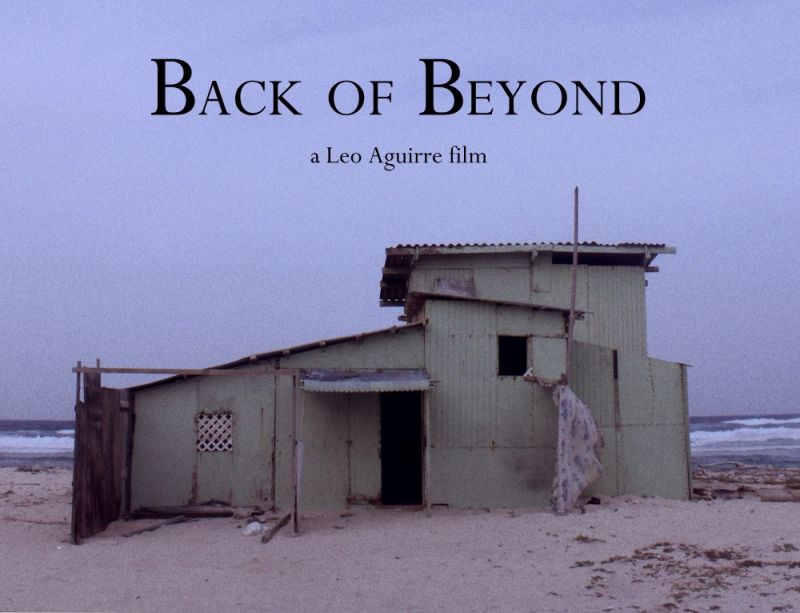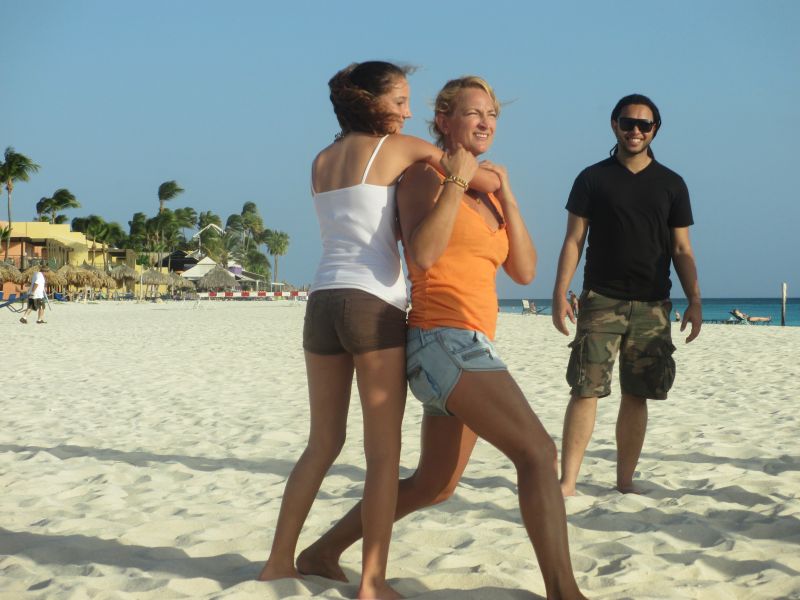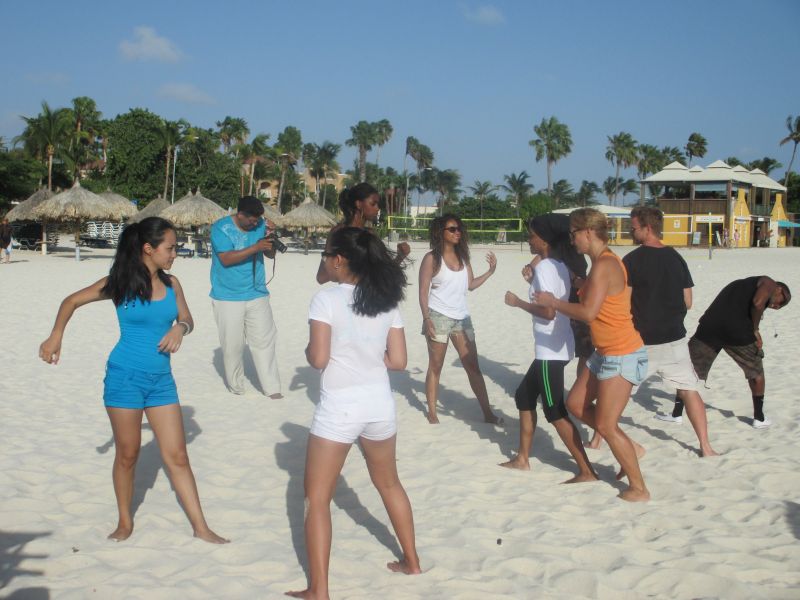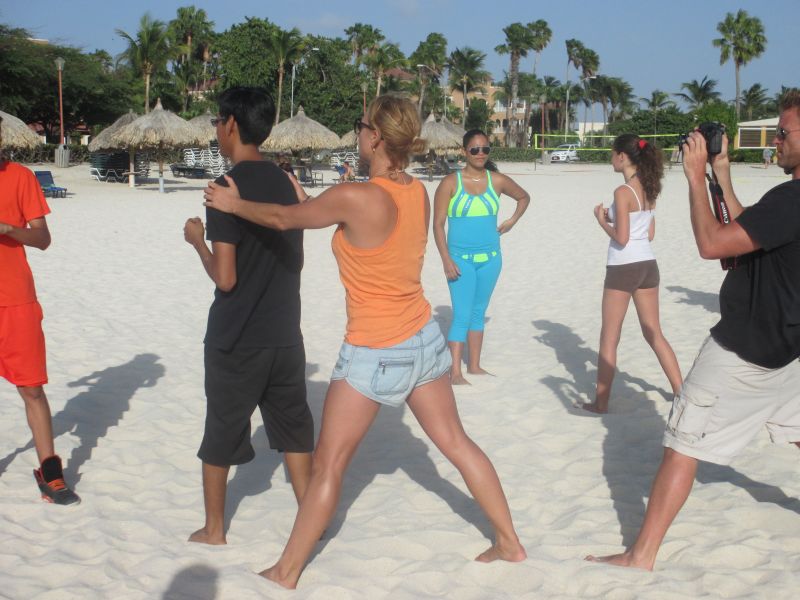|
|
||
|
Pro Tools
FILMFESTIVALS | 24/7 world wide coverageWelcome ! Enjoy the best of both worlds: Film & Festival News, exploring the best of the film festivals community. Launched in 1995, relentlessly connecting films to festivals, documenting and promoting festivals worldwide. Working on an upgrade soon. For collaboration, editorial contributions, or publicity, please send us an email here. User login |
AIFF Interview with Aaron Hose
Last year one of the films to premier at the inaugural Aruba International Film Festival was Aruba native director Aaron Hose’s award-winning documentary film VOICES IN THE CLOUDS (2010). This year Hose acted as director of the Caribbean Spotlight Series (CSS) for the 2nd annual AIFF. When I asked Aaron what that was like he said, ‘it was a great learning experience that I hope to repeat next year’. Aaron’s film VOICES IN THE CLOUDS is a poignant look at Taiwanese diaspora who have lost all connection to their roots and feel a great sense of psychological incompleteness because of it. Two American Taiwanese brothers go on a journey back to their homeland to pick up the pieces of their broken family and to delve into the vital secrets of a nearly forgotten past. It is a universal story of crucial poignancy reminding us that while civilization forces us to move ever forward we should never forget where we came from. READ BELOW MY INTERVIEW WITH ARUBAN DIRECTOR AARON HOSE. ME: Can you tell us what 'Voices in the Clouds' means and why you chose that title? Also, how did you meet Tony Coolidge and when did you first learn about his story? AARON: "Voices in the Clouds" is actually inspired by a magazine article that was written years ago by Tony Coolidge (our main subject), titled "Village in the Clouds". In his article, Tony details the first time he is reunited with his family in Taiwan after prematurely losing his mother to cancer. The 'village' in question here is the mountainous town of Wulai (northern Taiwan), which, as Tony discovers, is a very popular destination for anyone wanting to learn about Taiwan's aboriginal cultures. It was during this first trip to Wulai that Tony also discovered that he and his family weren't "native Taiwanese" (descendants from the Han culture of neighboring "mainland" China), but that they were actually part of the Atayal tribe of Taiwan--an important part of Tony's family history that was purposely hidden from him by his mother. So the documentary chronicles Tony's search for answers and a sense of identity and belonging, as he journeys to connect with his indigenous heritage and appreciate the history and struggle of his ancestors. Over time, we changed the film's title from from "village" to "voices". Considering we were encountering all these interesting indigenous people while filming Tony in Taiwan, it just felt like the right thing to do. Yes, the film is primarily about Tony's journey, but it's also about the many people he meets along the way--each person having their own interesting take on the past, present and future of Taiwan's indigenous cultural landscape. ME: You are a director from Aruba right? What made you decide to make a film about a man from Taiwan? AARON: Though I was raised in Aruba, I have been living and working in the U.S. since 1994. I still consider myself a full-flegded "Arubano" (as they say in Papiamento), and I do travel back home at least once a year. I had actually met Tony through a friend of mine ('Voices' associate producer, Derek Bedini) who attended film school with me at Valencia College. He had read Tony's magazine article and was convinced that his story would make a great documentary. However, considering Tony had already "experienced" his first return back to Taiwan, it was hard to get funding for the film. But after years of hard work and fundraising, we finally made it happen. Derek was right... it does tell a very touching story, and it's a film we're all very proud of. ME: Do you think there are universal themes in your films that can speak to your own family and heritage and also to all other dying indigenous people in the world? AARON: The theme of "search for identity" is one that resonates with me, mainly because of my own ethnic background. Sure, I may have been born in the U.S., but I was raised primarily in Aruba, which allowed me to receive a Dutch elementary and secondary education. But then I returned to the U.S. for an American college education, and now I work here. So often times, I stop and wonder, "what am I exactly? Am I Aruban? American? Dutch?" Considering my Father has roots in Curaçao and Venezuela and my Mother in Puerto Rico, does that now make me Hispanic? This can be quite confusing sometimes, since I have not lived as part of one culture more than the other. I guess I (and most of my family) am somewhat of a walking melting pot. One thing's for sure... I am definitely Aruban at heart. Always.... ...Furthermore, the theme of "cultural preservation" is very near and dear to my heart as well, especially considering how small of a country Aruba is. As I drive around the island and see how much has changed, I wonder if it is changing for the better. Sure, Aruba is becoming more modern... but is it losing its "essence"? There seems to be a notion in Aruba that, "the more we cater toward foreign tastes, the more foreigners will like us and want to visit us." This is evidenced by the flurry of "Americanized" shopping districts that are built every few years. I was also fielding complaints from tourists, claiming that Aruba is "not as beautiful culturally as it once was". Not to mention, I was hearing more and more teenagers speaking English. Not that's there's something wrong with that per se. I was just questioning why they chose not to speak (our native language) Papiamento instead. I will say this though... I am glad to see Papiamento now being offered as a course in Aruban high schools. That is one major improvement from when I lived there 17 years ago.... ...The same goes for indigenous cultures around the world. As indigenous cultures are becoming more modernized, certain elements will vanish into history books. That part is inevitable. Other elements however, such as language, can still be saved. Something as simple as teaching our young ones how to speak these languages, now that can go a long way. ME: When did you decide to make a film about Tony's search and how difficult (or easy) was the experience to make this documentary? AARON: As we started fundraising for 'Voices', the initial idea was to do the film as a docu-drama... part documentary, part re-enactment. This was because Tony's first reunion with his family had already occurred before we had even met Tony. But our creative approach was being frowned upon by many of the grant-making organizations that we applied to. So we were actually considering shelving the project permanently. That is, until Tony decided to launch a non-profit organization to help raise international awareness of the tribes of Taiwan. One of his organization's initiatives was to organize an "indigenous heritage festival," which had performers coming to Orlando form all corners of the globe. As a result of the festival, Tony received an invitation to return to Taiwan to learn more about his people. The invitation was extended by Alice Takewatan, one of the Taiwanese participants in Tony's festival, and subsequently, one of the most important people in our film as well. So... the documentary happened after all, just not the way we had planned it. But ultimately this resulted in a much better film than what we originally envisioned... ...The main challenge of making the film in Taiwan was breaking through the many language barriers we hit. We had multi-lingual translators with us at all times as we traveled across the island, so we could communicate from Chinese to English, or in some cases, from Atayal to Chinese, then to English. This made for some nightmarish scenarios, as we would go for days not knowing exactly what was in the can. All we could do was hope for the best. Upon our return to the U.S. we had to enlist Chinese speakers to help transcribe our non-English material into something manageable. It would take us a few years before we could fully hone in on the best possible story for the film. But we eventually got there. ME: How has the reception of your film been by audiences since the film's premier in Aruba 2010? AARON: For a niche film such as ours, I think we have had a successful film festival run, screening not only in Aruba but also at festivals in the U.K., Canada and the United States. The film has also won some nice awards along the way. Considering the international documentary field is so incredibly competitive, it has been very difficult to gain entry into the upper tier festivals such as IDFA, Thessaloniki, One World, Ambulante, Sundance, Hot Docs, Full Frame, Silverdocs, or Margaret Mead. But I'm happy to say that we have still been able amass a solid following among Asian Americans, Eurasians and Taiwanese. Most recently, we premiered the film in Taipei, Taiwan as the Closing Night Film of the 10th Annual Urban Nomad FIlm Festival. This was Tony Coolidge's first time attending a film festival, so it was great to have him there representing the film and doing Q&A with the sold-out audience of nearly 200.... ...Since the premiere, Tony has been taking the film around Taiwan as part of Urban Nomad's touring component. Considering the film is most important for people "in" Taiwan, we could not be happier. We still have a few film festival submissions pending, but in the meantime, the DVD is for sale on our website at http://voicesintheclouds.com ME: What do you hope that people will take away from your film? It is a beautiful film and very moving. Has it been hard to find an audience? AARON: Sure, it has been hard to find an audience. But we have received a great deal of support. Now that we've finally shown the film in Taiwan, our support continues to grow. We are grateful for this. What I have learned in the past year is, most films with this kind of "niche" topic will face marketing challenges. It is up to you as the filmmaker to "acknowledge" that these challenges exist "before" taking on the project. We understand that 'Voices' is not a celebrity biopic, or a documentary about the war in Afghanistan, the Holocaust, the world economy, the American education system, or the AIDS epidemic in Africa. These are all topics that will forever dominate the film festival circuit. And for good reason--these films sell. With this in mind, we knew what we were up against. But all things considered, we've still done well with 'Voices'. More importantly, the film has been opening doors for Tony in Taiwan, to connect with more indigenous groups to the point where he can really start to "affect change" in his country. Now that, to us, is priceless. ME: How hard is it to be a filmmaker from Aruba living in America? Do you feel displaced like Tony? AARON: Perhaps a bit displaced, yes. See, when I left Aruba to go to college in Florida (in 1994), I was not allowed to take out a student loan to study anything arts-related. I hope this is no longer the case, and that students are being offered funding for arts education. I say this with a little bit of shame... but one of the main reasons why I am in America is because I have U.S. citizenship (I was born in Texas). But even if I wanted to return to Aruba, unfortunately, there really is no filmmaking industry in Aruba.... yet. Aruba does have some quality television and video producers and motion graphic designers, but I haven't seen any feature films produced in Aruba lately. ME: Now that there is an International film festival in Aruba do you hope this is the beginning of a real Aruba film making future? AARON: Absolutely. We're hoping that after the recent success of the 2nd Annual Aruba International Film Festival, cultural organizations in Aruba will start to realize the importance of not only making funding available to Aruban filmmakers, but to also have educational initiatives in place that will motivate locals to pursue filmmaking as a career. The two Aruban productions that were screened in the Caribbean Spotlight Series section of the festival, "10 Ave Maria" and "Muhe Frida", received a lot of media attention, so we're hoping this will be the beginning of something special on the island. As a direct result of the buzz, the Aruba Minister of Culture, Economic and Social Affairs, Michelle Hooyboer-Winklaar, organized a special screening of the two Aruban films for the entire Aruban parliament. If that doesn't say something positive about the filmmaking future of the island, nothing else will. ME: What are your next projects and future goals as a director? AARON: I am currently working on a few projects. One is a (untitled) behind-the-scenes documentary on the creation of an LGBTQ stage production. I am also assisting my two 'Voices' producers, Chris Bremer and John Schaub, as cinematographers on their current feature documentaries (I love shooting as well), both due next year. Lastly, there's a fictional narrative that has been brewing in my head for the past year. I am just now starting to write it. I like to think of it as a cross between Hans Christian Andersen's "The Little Mermaid" and Tomas Alfredson's "Let The Right One In," with a twist of Guillermo Del Toro's "Pan's Labyrinth". And did I mention that I may want to shoot it in Aruba? ;-) ME: Wow, Aaron, your energy and vision are contagious. Your film and others featured at the AIFF are really what filmmaking is all about, proving that cinema still is the most powerful international language with the ability to change the world. You’re an inspiration. Thank you! AARON: Vanessa, thank you for this!! ☺ Interview conducted by Vanessa McMahon on June 28, 2011 AARON CONT.: All of film photos were taken by me or Chris Bremer, my co-cinematographer on the film. Most of these photos are part of an exhibit we produced "Time in Disappearing World," to raise money for the tattooed elders in Taiwan as well as for post-production and marketing of the film. ;-) Since premiering at AIFF 2010, 'Voices' has screened at fests in the U.S., Canada, Europe and most recently (this past May) as Closing Night Film at Urban Nomad Film Festival in Taipei, Taiwan. We've also won some awards at fests here in the U.S. All the fest info is detailed on the Vimeo page. The DVD is currently being self-distributed. still from VOICES IN THE CLOUDS (2010) AIFF "Voices in the Clouds" is an intimate look at one man's search for the spirit of his late mother through the discovery and exploration of his indigenous roots. Through his journey the audience will become well-acquainted with and emotionally connected to the indigenous people and cultures of Taiwan. 'Voices' celebrates the importance of family, and illustrates the personal richness and fulfillment that is born from being intimately connected to one's ethnic heritage and culture. OFFICIAL SELECTIONS:• Aruba International Film Festival - World Premiere (June 2010)• Native Spirit Festival (London, Oct. 2010)• San Diego Asian Film Festival - North American Premiere (Oct. 2010) • Alexandria Film Festival (Nov. 2010)• Gasparilla International Film Festival (Mar. 2011) • Riverside International Film Festival (Apr. 2011) • DisOrient Asian American Film Festival (Apr. 2011)• CLOSING NIGHT FILM - Urban Nomad Film Festival (Taiwan, May 2011)• Dreamspeakers Film Festival (Canada, June 2011) AWARDS:• Best of Category Award for "Indigenous & Native Peoples Film" - Montana CINE International Film Festival (Oct. 2010)• Spirit of Place Award for "Best Use of Traditional Music" - Orlando Latin-American Film & Heritage Festival (Feb. 2011)• Spirit of Place Award for "Best Cultural Awareness Message" - Orlando Latin-American Film & Heritage Festival (Feb. 2011)• Spirit of Place Award for "Best Human Rights Message" - Orlando Latin-American Film & Heritage Festival (Feb. 2011) Website: voicesintheclouds.com Facebook page: facebook.com/ voicesintheclouds 29.06.2011 | Aruba International Film Festival's blog Cat. : AARON CONT Aaron Hosé Afghanistan Africa AIFF Interview with Aaron Hose Alexandria Film Alice Takewatan America American Film Festival Aruba Aruban parliament Business Business Canada Caribbean Chris Bremer Cine Contact Details Derek Bedini Director Education Education energy Entertainment Entertainment Europe Facebook facebook.com Film & Heritage Festival FILM - Urban Nomad Film Festival Film at Urban Nomad Film Festival Florida forward Guillermo Del Toro Head Hot Docs http://voicesintheclouds.com Human Interest Human Interest John Schaub Let The Right One In London Major Margaret Mead Michelle Hooyboer-Winklaar minister of culture Montana Movie Release northern Taiwan Orlando Pan's Labyrinth Pan's Labyrinth Person Attributes Person Career Person Location Person Travel premier Producer Puerto Rico Quotation San Diego San Diego Asian Film Festival SILVERDOCS Social Issues Social Issues Sundance Taipei Taiwan Technology Technology Texas the 10th Annual Urban Nomad FIlm Festival the 2nd Annual Aruba International Film Festival The Little Mermaid Time in Disappearing World Tomas Alfredson Tony Coolidge Toro's "Pan Traditional Music United Kingdom United States Valencia Valencia College Vanessa McMahon Venezuela Voices Voices VOICES IN THE CLOUDS Wulai Interviews
|
LinksThe Bulletin Board > The Bulletin Board Blog Following News Interview with EFM (Berlin) Director
Interview with IFTA Chairman (AFM)
Interview with Cannes Marche du Film Director
Filmfestivals.com dailies live coverage from > Live from India
Useful links for the indies: > Big files transfer
+ SUBSCRIBE to the weekly Newsletter Deals+ Special offers and discounts from filmfestivals.com Selected fun offers
> Bonus Casino
User imagesAbout Aruba International Film Festival Vieira Jonathan Vieira Jonathan The official Aruba International Film festival's blog View my profile Send me a message My festivalThe EditorUser contributions |



















.jpg)








